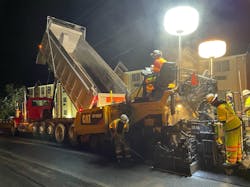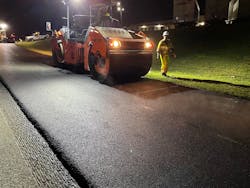By Karen Hanna
A Lockerbie, Scotland, company is looking to pave the way for more-sustainable roads — with modifiers for asphalt sourced from plastic waste.
Last year, MacRebur Ltd. took part in its first public works project in the U.S., by providing bitumen-extenders to the Virginia Department of Transportation (VDOT) to pave a surface nearly 1 mile long.
“Suitable waste plastics are cleaned, melted and extruded into high-density pellet form for transportation,” the company says in a report. “Various pellets are then blended together to provide the desired performance properties and bagged for transportation, usually in [1.1-ton] bulker bags or [6.6-pound] melt-bags. The process is controlled by an accredited quality system allowing each package of product to be traced to a specific production batch and the associated sources of recycled waste plastic.”
VDOT tried a number of new materials, including products from MacRebur; however, it is too early to draw conclusions about their effectiveness, a spokesman said.
But VDOT anticipates the material will last as long as traditional asphalt.
“VDOT’s initial experience with MacRebur in the lab and during installation in the field has been promising — and the department looks forward to the opportunity for future collaboration, as it does with many other companies currently participating in research projects,” VDOT spokesman Kyle Gibson said.
The road in Chesterfield County, Va., contains more than 6,600 pounds of MacRebur’s modifiers, effectively diverting the equivalent of 600,000 single-use plastic bags from landfill.
MacRebur’s path started at a school assembly where eventual co-founder and CEO Toby McCartney found his calling. A teacher asked students what lives in the world’s oceans. While some students proffered, “Fish” or “Whales,” McCartney’s 6-year-old daughter provided an answer that’s stayed with him, “Plastics.”
The Scotsman, who had witnessed people in India burning plastic to fill in potholes, had been pondering what to do about bad roads.
“And I thought, that’s brilliant. ... What if I did that on my road at home?” McCartney said in a 2017 presentation to a TedX talk at Cambridge University.
Over years of testing, MacRebur’s products have demonstrated numerous advantages over traditional asphalt products, the company said.
According to McCartney, roads that incorporate the modifiers are up to 60 percent stronger and last up to 10 times longer. Because they contain plastic, the roads are more flexible, so they’ll maintain their integrity under conditions — like freezing and thawing — that normally cause damage. The company said they’re cheaper to make, too, because they save on bitumen, a petroleum product.
MacRebur products have different characteristics, to suit different needs and applications. Because of its deformation-resistance, MR6 is appropriate for use paving surfacing intersections, roundabouts and other roads for slow-moving, heavy-vehicle traffic; meanwhile, the company says, "MR8 works best for surfacing car parks, driveways and local roads, where sustainability and economics are the primary drivers."
Testing has shown that the products do not leach plastic or generate fumes.
The company says that roads made with the products can be rehabbed with more plastic waste.
“[When] a MacRebur road reaches the end of its life, the road can be dredged back up, more waste plastic can be added, and the same material can be re-laid. This represents a truly circular process that’s not only better for the planet, but better for our roads,” the company said.
According to MacRebur, for every mile-long stretch of two-lane road paved with asphalt containing the modifiers, rather than traditional mixes, crews realize a carbon-dioxide-equivalent offset of about 36 tons.
During his TedX talk, McCartney himself expressed surprise at the products' success.
“Who would have thought it, though, that your old rubbish can make our roads stronger and longer-lasting?” he asked.
Karen Hanna, senior staff reporter
About the Author
Karen Hanna
Senior Staff Reporter
Senior Staff Reporter Karen Hanna covers injection molding, molds and tooling, processors, workforce and other topics, and writes features including In Other Words and Problem Solved for Plastics Machinery & Manufacturing, Plastics Recycling and The Journal of Blow Molding. She has more than 15 years of experience in daily and magazine journalism.


